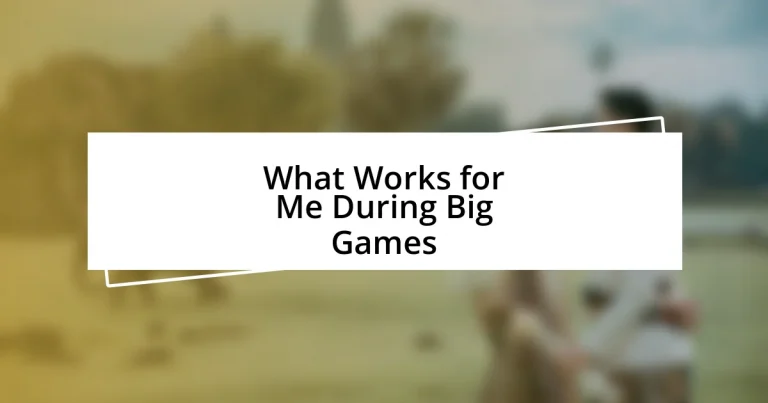Key takeaways:
- Big game pressure can affect mindset and performance; self-imposed fears and community support play significant roles in managing it.
- Establishing a pre-game routine, including mindfulness and visualization, enhances focus and reduces anxiety during matches.
- Reflecting on performance post-game allows for personal growth, turning setbacks into motivation and celebrating small victories for continued improvement.
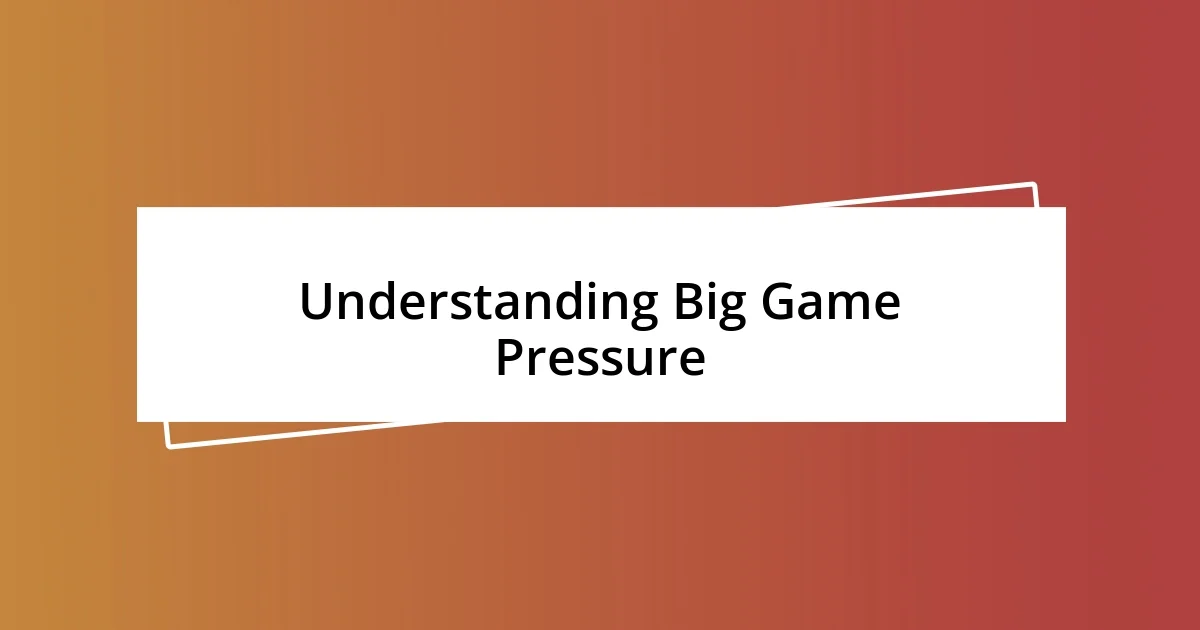
Understanding Big Game Pressure
Big game pressure is a unique beast that can turn even the most seasoned players into bundles of nerves. I remember once being in a crucial match where the stakes felt higher than ever. My heart raced, and I could feel the weight of my teammates’ hopes resting on my shoulders. Have you ever been in a situation where everything seemed to hinge on your next move? That’s exactly what big game pressure feels like.
It’s fascinating how pressure can affect not just our performance but also our mindset. In those moments, it’s like there’s a fog in my head. My usual instincts feel muted, and doubt begins to creep in. Reflecting on those challenges, I realized that this pressure is often self-imposed, stemming from our own expectations and fears of failure. Can we train ourselves to embrace that pressure instead of fearing it?
Moreover, the energy in the arena adds another layer to this pressure. I’ve stood on the field, surrounded by a roaring crowd, feeling both exhilaration and intimidation. The atmosphere buzzes, and you can almost taste the anticipation. It’s this blend of excitement and anxiety that can either fuel our performance or derail it entirely. So, how do we harness that energy without letting it overwhelm us?
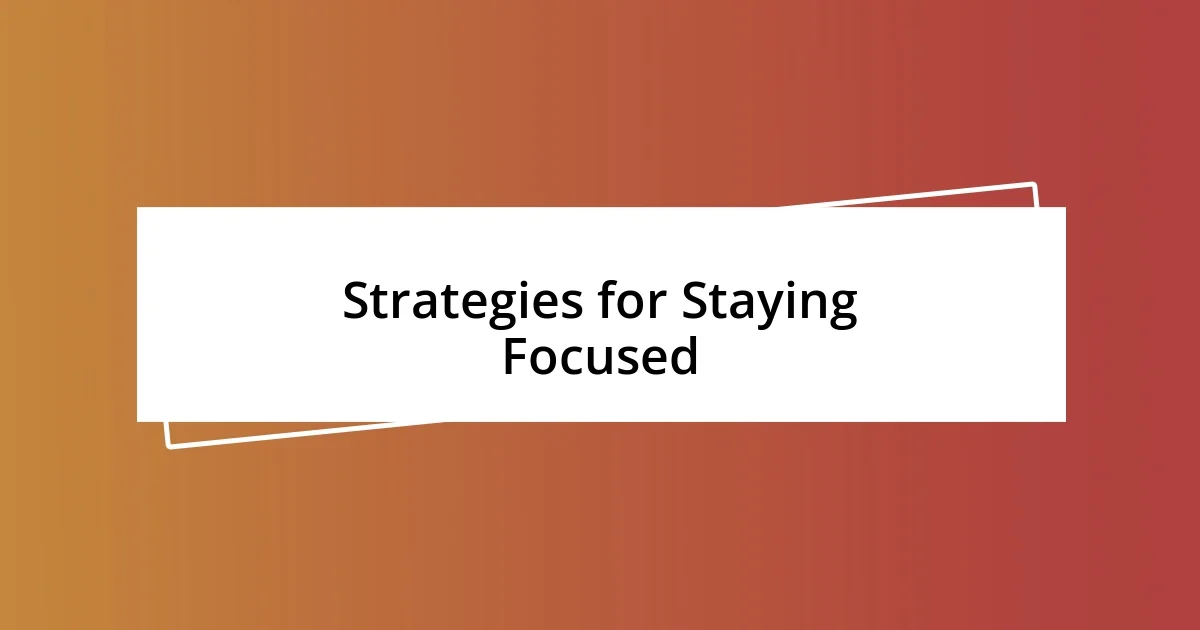
Strategies for Staying Focused
When it comes to staying focused during big games, I find that creating a pre-game routine is essential. Before every match, I take a moment to center myself—breathing deeply and visualizing the game ahead. This simple practice helps clear my head, allowing me to focus on what’s important rather than the noise around me. Have you ever noticed how a few minutes of mindfulness can transform your mindset? For me, it’s like hitting the reset button.
Another strategy I’ve adopted is to break the game into smaller segments. Instead of thinking of the entire match as one big challenge, I focus on playing one play at a time. This shift in perspective reduces my anxiety and keeps me grounded in the moment. I remember a playoff game where I initially felt overwhelmed by the magnitude of what was at stake. But by focusing on executing each play, I was able to immerse myself in the game without the weight of expectations. Isn’t it interesting how narrowing our scope can foster clarity?
Lastly, I’ve found that surrounding myself with supportive teammates is invaluable. During high-pressure moments, positive feedback and encouragement can be the glue that holds the team together. There’s comfort in exchanging glances with a teammate who understands the pressure we feel—the kind of shared connection that reinvigorates my focus and determination. Have you felt that rush of solidarity in critical situations? It’s in these moments I realize we’re not just playing for ourselves, but for each other too.
| Strategy | Description |
|---|---|
| Pre-game Routine | Centering myself through mindfulness and visualization to reduce anxiety. |
| Segment the Game | Focusing on one play at a time to stay grounded and focused. |
| Supportive Teammates | Engaging with teammates for encouragement during high-pressure moments. |
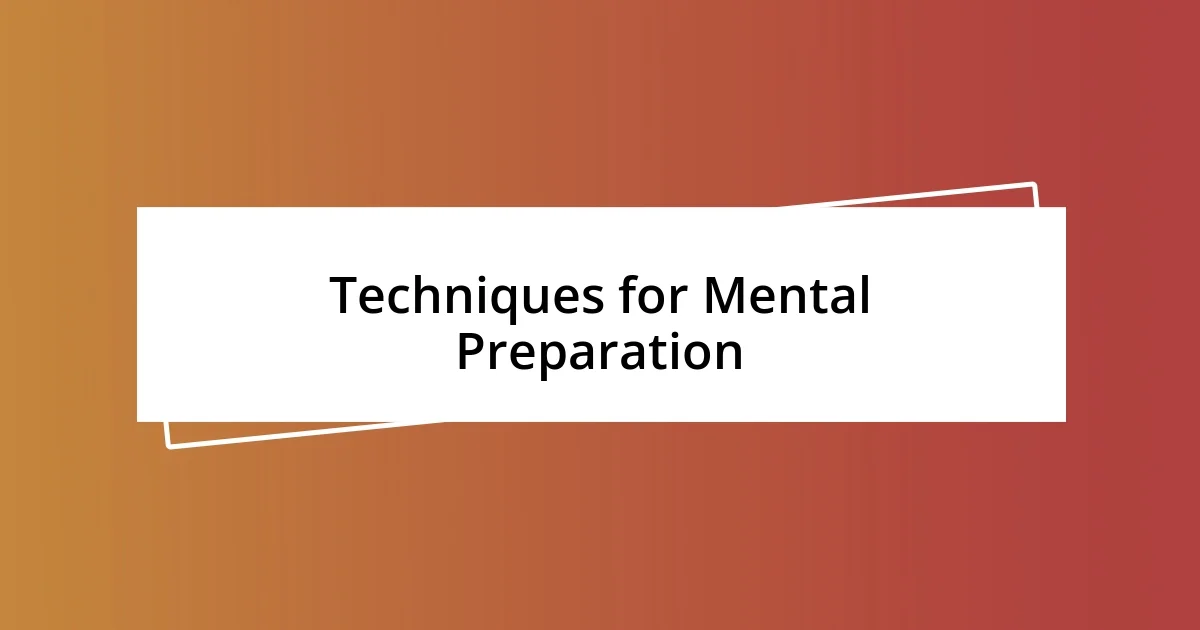
Techniques for Mental Preparation
Mental preparation is crucial for tackling the intensity of big games. One of the techniques I find effective is practicing positive affirmations. Before I step onto the field, I quietly remind myself of my strengths and past successes. It’s a small yet powerful ritual that shifts my mindset from doubt to confidence. I vividly remember before a championship match, whispering to myself, “You’ve trained for this; you belong here.” That simple reminder helped calm my nerves and allowed me to channel my focus where it needed to be.
Another key technique involves mentally rehearsing game scenarios. Visualizing how I’d react to different situations enhances my confidence. For example, before a critical game, I vividly imagined making a crucial play under pressure. This mental exercise not only prepared me for potential outcomes but also reduced my anxiety during the actual game. Have you ever felt how visualizing success can help create a sense of familiarity with the moment?
Here are some techniques for mental preparation that I’ve found to be beneficial:
- Positive Affirmations: Repeating affirmations helps shift focus from nerves to confidence.
- Visualization: Mentally rehearsing scenarios prepares your mind for success.
- Breathing Techniques: Deep breathing can help calm the mind and body, grounding you in the present.
- Journaling: Writing down thoughts and feelings before the game can clarify your mindset.
- Mindful Meditation: Spending a few minutes in quiet reflection can enhance focus and clarity.
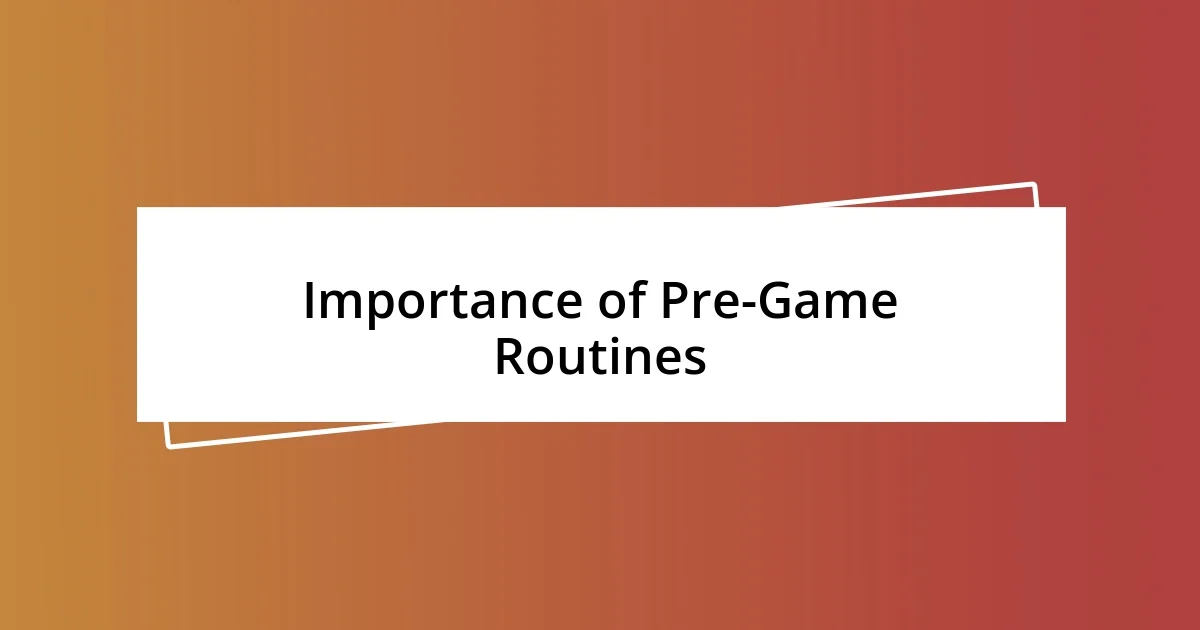
Importance of Pre-Game Routines
Establishing a pre-game routine is a game changer for me. I remember one specific game where I absolutely bombed without my usual preparation. The moment I stepped onto the field without my ritual left me feeling scattered and out of sync. It truly highlighted how those familiar actions, like stretching and listening to music, help me mentally prepare and calm my nerves. Have you ever experienced that unsettling feeling of walking onto the field unprepared? It’s a stark reminder of the importance of my routine.
One component of my pre-game routine involves a brief reflection on what I’ve achieved so far. Before a big match, I often sit quietly, recalling my past performances, good and bad. This practice serves as a boost, reminding me that I am capable and ready for the task ahead. Isn’t it amazing how reviewing our journey can foster motivation, pushing away those nagging doubts?
I also find comfort in rituals shared with teammates. Whether that’s gathering for a quick huddle or sharing a laugh, these moments create a sense of unity that amplifies my focus. I recall one match where, just before kickoff, we kicked around some light-hearted banter to ease our nerves. In those few moments, I felt a wave of calm wash over me, fully aware that we were in it together. Doesn’t it feel empowering to know you’re not alone, especially in high-stakes situations?

Managing Physical Energy Levels
Managing physical energy levels is crucial for peak performance during big games. I’ve found that staying mindful of my body’s signals directly impacts how I approach the game. For instance, before a major event, I pay close attention to hydration and nutrition, making sure I’m fueling my body with the right foods. I vividly recall one championship where I didn’t hydrate properly, and halfway through the game, I felt drained. It was a tough lesson that taught me the importance of pre-game meals and hydration strategies.
Incorporating regular warm-up exercises also plays a pivotal role in managing my energy levels. I like to engage in dynamic stretching and light jogging to get my blood flowing. There was a moment in a particularly tense match where my team and I did a thorough warm-up together, which not only energized our bodies but also boosted our camaraderie. The difference in feeling “on” versus sluggish was palpable. Isn’t it amazing how that warm-up routine transforms our physical state and readiness?
Finally, pacing myself during the game is something I’ve learned the hard way. In one intense match, I pushed too hard too early and ended up feeling like I was running on fumes by the end. Now, I consciously focus on my breath and try to regulate my effort throughout the game. I’ve noticed that taking short moments to gather myself often makes a world of difference. How about you? Have you felt the importance of pacing when the adrenaline kicks in? Recognizing when to push and when to hold back can be the key to sustained energy and performance.
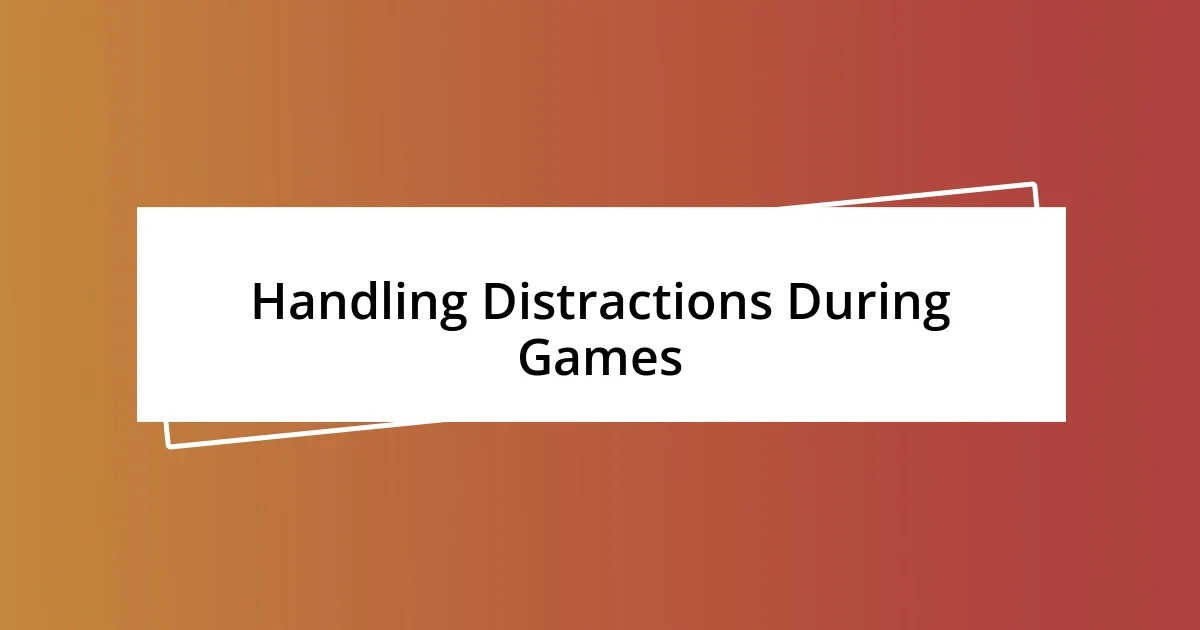
Handling Distractions During Games
Handling distractions effectively is essential to stay in the zone during big games. I often find myself battling against the noise and chaos around me, especially in high-pressure situations. There was a pivotal moment in one game where the crowd’s cheers became overwhelming, to the point where I lost my focus. I realized that taking a deep breath and zeroing in on my immediate surroundings—noticing the grass, the goalposts, even my teammates—can create a calm bubble that shields me from distractions. Have you ever tried to block everything out and just focus on what matters?
I’ve also discovered that having a mantra or a phrase can be incredibly grounding. In one particularly intense match, amidst all the chaos on the field, I kept whispering to myself, “Stay present.” This simple practice helped me center my thoughts and keep distractions at bay, allowing me to perform better. The power of language as a tool for focus can’t be understated; it’s intriguing how the right words can cut through the noise, isn’t it?
Another strategy that works wonders for me is visualizing success before the game begins. Before I step onto the field, I take a moment to picture myself executing plays flawlessly. I remember once, in a critical championship, I visualized making the winning goal. The feeling of that moment stayed with me throughout the match, helping me stay focused and minimizing any external distractions. How often do you visualize success when preparing for something big? It’s a technique that not only builds confidence but also reinforces your ability to stay in the moment amidst the whirlwind of energy and expectations.
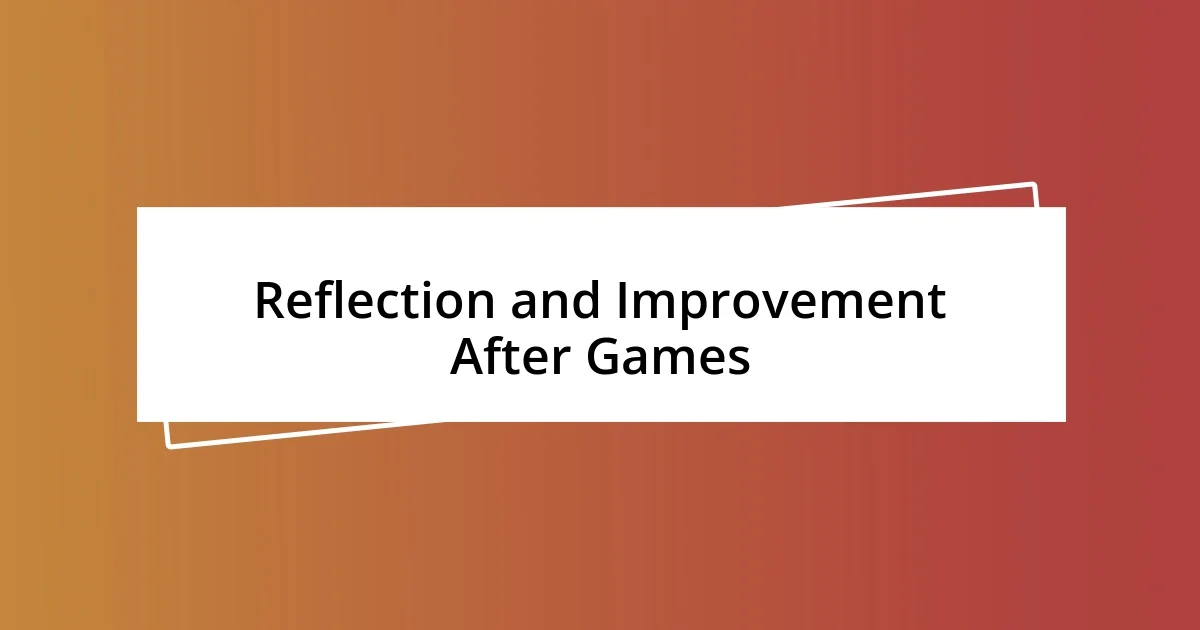
Reflection and Improvement After Games
Reflecting on my performance after a big game is something I’ve come to cherish as part of my growth. I remember sitting down with my teammates after an intense match, sharing our experiences and insights. Those post-game discussions helped me understand not just what went well, but also where I could improve. It’s fascinating how a collective reflection can uncover strengths and weaknesses we might overlook on our own. Have you ever taken the time to debrief with someone after a big event? You might be surprised by the shared insights.
What’s striking to me is how emotions play a significant role in this reflection process. After one particularly challenging game where I felt I could have contributed more, I found myself wrestling with disappointment. But instead of lingering on those feelings, I jotted down key moments that affected my performance. This exercise allowed me to transform that disappointment into motivation. It’s almost cathartic to put thoughts on paper—have you ever tried that method? I think it’s incredibly powerful for turning setbacks into actionable plans.
I’ve also learned to celebrate my wins, no matter how small. I recall a game where I executed a perfect pass, and despite our loss, that moment felt like a significant personal victory. Reflecting on both successes and areas for improvement gives me a balanced view of my performance. Looking back, how do you measure your progress? I’ve found that recognizing these little victories not only builds confidence but also fuels my desire to keep pushing forward.












